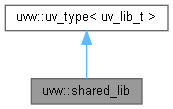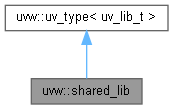The shared lib class. More...
#include <lib.h>
Inheritance diagram for uvw::shared_lib:

Collaboration diagram for uvw::shared_lib:

Public Member Functions | |
| operator bool () const noexcept | |
| Checks if the library has been correctly opened. | |
| template<typename F > | |
| F * | sym (const std::string &name) |
| Retrieves a data pointer from a dynamic library. | |
| const char * | error () const noexcept |
| Returns the last error message, if any. | |
 Public Member Functions inherited from uvw::uv_type< uv_lib_t > Public Member Functions inherited from uvw::uv_type< uv_lib_t > | |
| virtual int | init () |
| Initializes the handle. | |
| loop & | parent () const noexcept |
| Gets the loop from which the resource was originated. | |
| const uv_lib_t * | raw () const noexcept |
| Gets the underlying raw data structure. | |
| uv_lib_t * | raw () noexcept |
| Gets the underlying raw data structure. | |
Detailed Description
The shared lib class.
uvw provides cross platform utilities for loading shared libraries and retrieving symbols from them, by means of the API offered by libuv.
Member Function Documentation
◆ error()
|
noexcept |
Returns the last error message, if any.
- Returns
- The last error message, if any.
◆ operator bool()
|
explicitnoexcept |
Checks if the library has been correctly opened.
- Returns
- True if the library is opened, false otherwise.
◆ sym()
template<typename F >
|
inline |
Retrieves a data pointer from a dynamic library.
F shall be a valid function type (as an example, void(int)).
It is legal for a symbol to map to nullptr.
- Parameters
-
name The symbol to be retrieved.
- Returns
- A valid function pointer in case of success,
nullptrotherwise.
The documentation for this class was generated from the following file:
- src/uvw/lib.h